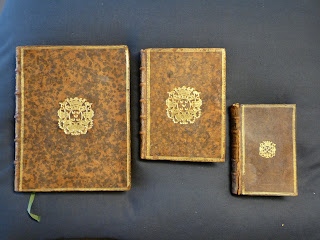28-04-2011
14-04-2011
13-04-2011
Serendipity?
It seems serendipity struck on 18th November 2010 when, on opening a box at Special Collections, I found this binding.
A quick search on internet revealed the similarity to the coat of arms of the Pinto family, which also has five crescent moons. However, which family member was the bibliophile? The U.v.A description does not give further details. My query on this blog was answered by an Italian reader who enclosed a link to the Italian/Napoletan Pinto's with a coat of arms with the same five crescents. Meanwhile I was thinking in the direction of the most famous Pinto on the internet, being the 68th Grandmaster of the Sovereign Military Order of Saint John Knights of Malta, the Portuguese Manuel Pinto de Fonseca (1681-1773). And indeed it was long thought the armorial bindings were his (Guichard 1890). It wasn't until last week that further clues regarding the provenance came to me through K.G. According to Storm van Leeuwen the bindings are from the book collection of the Portuguese/Jewish Aaron Joseph de Pinto (1710-1758) from Amsterdam.
A lucky find which merits my further research. Back to library and archive.
Serendipity with a birthday feeling.
J. Storm van Leeuwen, Dutch Decorated Bookbinding in the Eighteenth Century. 't Goy/Houten: Hes & De Graaf, 2006. 4 vols.
A quick search on internet revealed the similarity to the coat of arms of the Pinto family, which also has five crescent moons. However, which family member was the bibliophile? The U.v.A description does not give further details. My query on this blog was answered by an Italian reader who enclosed a link to the Italian/Napoletan Pinto's with a coat of arms with the same five crescents. Meanwhile I was thinking in the direction of the most famous Pinto on the internet, being the 68th Grandmaster of the Sovereign Military Order of Saint John Knights of Malta, the Portuguese Manuel Pinto de Fonseca (1681-1773). And indeed it was long thought the armorial bindings were his (Guichard 1890). It wasn't until last week that further clues regarding the provenance came to me through K.G. According to Storm van Leeuwen the bindings are from the book collection of the Portuguese/Jewish Aaron Joseph de Pinto (1710-1758) from Amsterdam.
A lucky find which merits my further research. Back to library and archive.
Serendipity with a birthday feeling.
J. Storm van Leeuwen, Dutch Decorated Bookbinding in the Eighteenth Century. 't Goy/Houten: Hes & De Graaf, 2006. 4 vols.
06-04-2011
Ongoing
inspiration often comes from the unforeseen. At the present I am motivated from several directions. Firstly being asked to write an exposition on the value of provenance for book history. Secondly by an unforeseen flow of interaction with ex-University of Amsterdam book researcher K.G., who has spent the past thirty+ years, among other things, reassembling the library of the bibliophile 16th century Dutch pastor Jacob Buyck. And last but not least by a reader of this blog, omnivore like myself, who through her work in Rabelais.nl, led me to re-examine an insignificant paper on Samuel Kinser's monograph Rabelais's Carnival, written during my Comparative Literature studies, in which Rabelais is not so much the object of discussion, as is Kinser's research method.
Abonneren op:
Posts (Atom)


